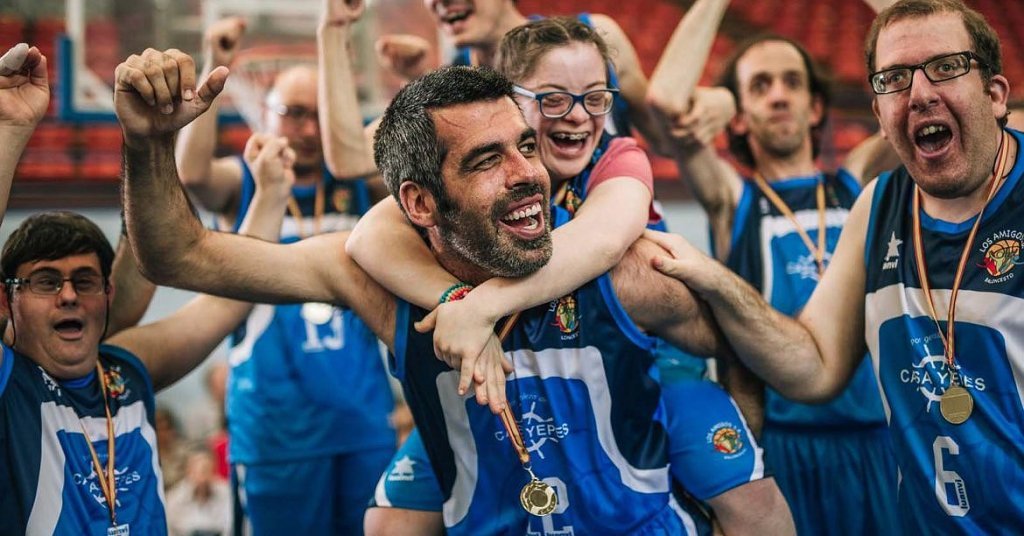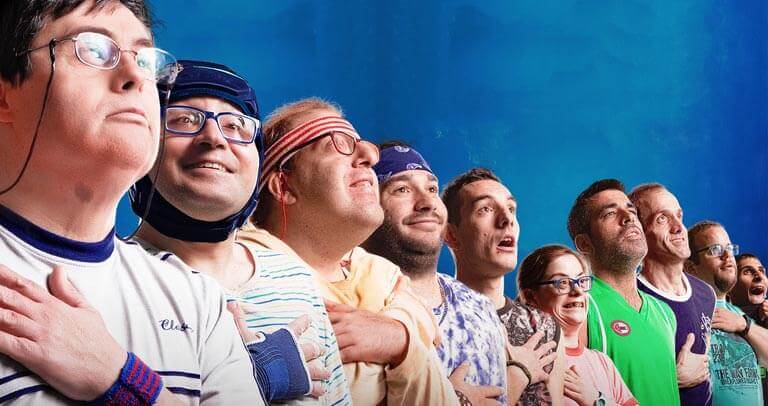Champions: A Lesson in Humanity


Written and verified by the film critic Leah Padalino
The cinema, beyond its entertainment value, can also become a powerful weapon. In fact, it’s capable of transmitting powerful messages. For instance, it can condemn, criticize, and vindicate. The communication theorist, Marshall McLuhan coined the phrase “the medium is the message”. Cinema is a great medium. The film we’re going to talk about in this article is Champions (Campeones)(Javier Fesser, 2018). It was the big winner of the 33rd Goya Awards.
With a happy and innocent tone, Champions launches a clear and forceful message. It aims to remove the invisibility of certain people who are so often excluded from society. The movie won three Goya Awards. Best original song, best film, and best new actor for Jesús Vidal.
The movie is committed to valuing those people who, day after day, have to fight for their integration into an increasingly competitive and demanding society. It isn’t easy to make a film that sheds some light on intellectual disability while not falling into the trap of being too melodramatic or sentimental. However, Champions is tremendously optimistic, and it embraces differences with a smile, with attitudes of respect and inclusion.
The movie demonstrates that in a totally dehumanized world, what we need are smiles and a good dose of humanity.
The storyline
Marco Montes is an assistant coach for a prestigious Madrid basketball team. He’s an arrogant and rude man. Furthermore, his personal life isn’t at its best, and, professionally, he begins to falter. Montes loses his job and, after a series of altercations resulting from driving under the influence of alcohol, finds himself between a rock and a hard place.
In fact, Montes has to choose between spending time in prison or coaching a basketball team made up of people with intellectual disabilities. Obviously, the choice, albeit grudgingly, is clear. Therefore, we soon meet the members of the ‘Los Amigos’ team, and the situation, for Marco, becomes desperate.
Nevertheless, as time passes, he goes through a period of sensitization by learning a little more about the personal situation of each of the players. They all struggle, day by day, like any of us. However, for us, getting a job is something that we’ve completely normalized and we take for granted. Nevertheless, for people with disabilities, this situation is extremely difficult.
The dark side of disability
The film is quick to condemn. It tells us that there are countless things that we take for granted. To us, they’re normal and we no longer question them. But this isn’t the same for all members of society. In fact, we learn that even Marco himself was never able to become a professional basketball player because he wasn’t tall enough.
Champions also shows us the darker side of certain companies that take advantage of subsidies to hire people with disabilities. They undervalue and despise them, treating them in a different and derogatory manner.
In addition, the movie reminds us that our actions can greatly affect the lives of others. For instance, Marco drives under the influence of alcohol. This is an activity that, in addition to claiming countless lives, can cause other types of irreversible damage.
As we mentioned earlier, a film of this type can all too easily fall into the traps of clichés, sorrow, and sentimentality. Champions doesn’t completely escape the clichés, but it escapes the melodramatic, bringing us closer to a far more human vision.

Humor and sport as links of union
Sport should be about enjoyment, effort, and triumph. Unfortunately, in some cases, this vision is far from reality. In fact, we’re not just talking about elite sports, but those in our everyday lives. How often do we hear about quarreling in the sports field? How many children’s competitions are marred by unhealthy competitiveness? We don’t mean to ban competitiveness or suggest that we shouldn’t always give our best. Indeed, competitiveness is necessary, but shouldn’t be excessive.
In fact, it seems that we’ve lost respect. That, in the fight to be the best, we don’t mind who we step on. This is something that, as children, we didn’t know, but have learned over time.
Children, like the protagonists of the film, practice sports to have fun. Of course, we all want to win, we all want our efforts to be recognized, but that’s not why we should crush our rivals or cry in the face of defeat.
Sport should function as a link that’s capable of eliminating barriers and borders. A tool that allows us to enjoy, socialize, and also improve ourselves.
Naturally, we should always aim to win in the battles we face on a daily basis. However, winning doesn’t have to mean destroying our opponent. We don’t receive that lesson from Marco, but we learn it from his team, who still retain their innocence, purity, and who are capable of embracing their opponents, win or lose.
The humor works perfectly in Champions. Indeed, comedy occurs in various situations, but at no time does mockery appear. All the characters are capable of making us laugh, but not at them, with them. Therein lies the difference.

Champions, lessons for all
We learn from everything and everyone. The message of Champions isn’t limited only to its plot and its entity as a cinematographic product but it goes much further. For instance, the actors that make up the basketball team are people with no acting experience (except for Jesús Vidal) and they all have some type of disability.
They’ve been afforded visibility with the opportunity of starring in a film in which they more than demonstrate their suitability for their roles. With enthusiasm and work, they give performances that transcend any social mold. Indeed, we don’t even notice the labels so often given to them. We simply enjoy the film and its characters.
Inclusion is reflected both in the film and behind the scenes. In fact, Fesser relied on people with intellectual disabilities to work in other off-screen departments as well. They also had the support of different organizations which was a strong push in the right direction for them.
Jesús Vidal’s speech at the Goya Awards
The Goyas soaked up the energy and joy that Champions give us. Above all, they shone for the spectacular speech given by Jesús Vidal. It was a speech of thanks in which he gave a voice to all his colleagues and to all the people who, like him, have a disability. Vidal suffers from a visual disability of 90 percent, but this hasn’t proved to be an impediment for him. Indeed, he’s graduated in Hispanic Philology, taken a master’s degree in journalism, and, of course, demonstrated his acting skills.
Without a doubt, his speech was one that we should all hear. It brought smiles and tears of emotion in an environment that, sometimes, as in sports, is sullied by superficiality and excessive competitiveness. As Vidal pointed out: “Inclusion, visibility and diversity”. A great lesson and three much-needed words.
Capturing all that innocence and naturalness, Champions manages to convey a humanizing message. Awareness can occur in different ways, often via politics or the media. In this case, cinema offers us to change our perspective. To alter our way of seeing the people who, unfortunately, continue to be excluded and silenced.
Inspired by reality
The film was inspired by real events. Indeed, it was thanks to an article in the newspaper, that the idea arose. Although Champions isn’t the first film in history to deal with issues of inclusion, it’s certainly opened up and widened the path. It’s fun and refreshing. More importantly, it gives much-needed visibility to people with disabilities and to us, some life lessons. Because, like Marco, we still have a lot to learn.
“We are going out to win, not to humiliate.”
– Champions –
All cited sources were thoroughly reviewed by our team to ensure their quality, reliability, currency, and validity. The bibliography of this article was considered reliable and of academic or scientific accuracy.
- Malo, M. A. (2003). Las personas con discapacidad en el mercado de trabajo español. Revista del Ministerio de Trabajo y asuntos sociales, 46, 99-126.
- Monjas Casares, M. I., & Arranz Moro, F. (2010). El cine como recurso para el conocimiento de las personas con discapacidad: Veinticinco películas de la última década.
This text is provided for informational purposes only and does not replace consultation with a professional. If in doubt, consult your specialist.








